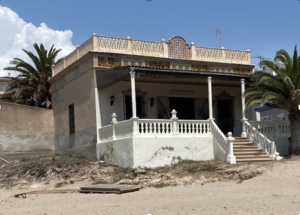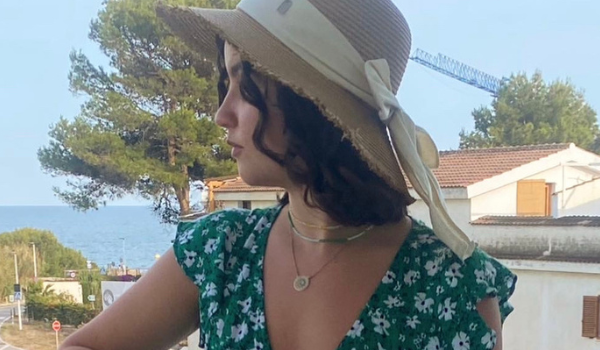Winner of the 2024 Lewis Edwards Memorial Prize
Pollyanna Jackson is an English Literature student based between Edinburgh and Oxfordshire, though soon to be making to move to Cumbria to start work as an Editor. She was shortlisted for the 2022 Bridport Prize, selected for Mark Gatiss’ writing programme with the Dartington Trust, and won the Lewis Edwards Memorial Prize in 2023 (and 2024). She enjoys writing fiction and short essays, and is always working on a novel.
‘Oops, I did it again! I’m completely bowled away and honoured to have won the Lewis Edwards Prize, this piece means a lot to me and it’s so rewarding to have it recognised.’
You can catch her on Substack https://open.substack.com/pub/pollyannamj
Her Instagram is @pollyanna.jackson
“Wide as the Wall is Wide.”

Yesterday the people woke
Naked with nothing to wear,
Hungry with nothing to eat,
And today they have awakened
Justly angry, bleeding justly.
— Miguel Hernández, “Upon the Dead I am Sitting.” 1937.
If it weren’t for the writer they would have burned this house down years ago, with us inside. Even now if I turn my head aside I catch the edges of smoke on the wind.
**
It’s the first morning in a while that the sea has been quiet. Sometimes, even early Spring days like this, it rocks like a furious snake, back and forth, back and forth, coil over coil of water hissing upon approach. Today it sits back from the shore, lazy, sultry, spitting at us from its retreated position. Nothing seems to want us here; the sand, our last defensive wall, cannot withstand forever the hungry mouth of that vast sea which wants so badly to swallow us. When the tide comes in my grandmother asks me if it will not go out again, if this time, this time, it will eat her whole. Then I sit with her and stroke her silver hair until the sea has skulked back off the spit. One of these days it is going to grow teeth.
**
The first half hour of my day is spent cleaning up the red wash from the steps. Somebody, and it could be anybody, but it will have been somebody, has thrown a bottle of wine onto the terrace and it has been bleeding out here all night. Hunting down the shards of glass, I listen out for my grandmother’s first call, but it seems today she will sleep in. I am alone among the green curves of broken glass, each large piece a bowed rib in an elephant’s graveyard, sticky with the sap of the label and its evaporating contents. Piecing them together, I see it is from a vineyard thirty miles up the coast near Vinaròs, and I wonder did they come with a spare bottle to spend their rage, or did somebody buy it just to throw it at us? As if we need more refuse from them— they’re the ones who let the nationalists down here to give us hell, as abuela tells it. Her father was shot a few yards from the Catalonian border, a bullet in his back the penance for a trade union membership. I don’t know how much of it she remembers and how much she has decided must be true because she feels it.
**
A cat stares up at me from beneath the boardwalk, her stomach swollen and teats visibly full of milk. She bares her teeth in case, like the others, I might throw rocks at her. There’s a whole colony of them out there and at night they fill the wet air with their mysterious language. Sometimes I feel the spirit, if not the shape, of their words, and I think if I could only part myself like the sea I might find the truth in them.
**
Abuela wants me; she is awake now. I sweep the last of the glass off the side of the terrace and go inside, into the dull smell of fear which I can never cover with the candles we burn because we haven’t been able to get lightbulbs for two years. I carry the old body from its bed and place it into a chair on terrace where she can be assured of the distance between our little house and the forever line of blue.
Today is a day for remembering. This is all we do; we have so little to eat that we must fatten ourselves on our innards, the flesh of our past. I bring out a pot of tea and two cups and we lay the hour’s silence across our laps to pick at.
**
Later I must go into town, to the only store which will sell us food, and only because I pay double, and if there is somebody else in there I must wait until they leave. This was not so terrible when I had a family.
“They want us all to starve?” Papá would reply every time I came back from the grocery with my brothers— the three bags we took, always in hope, never more than half-full.
“Chis,” abuela would say, “Chis, we won’t starve, Xímo. We will have to eat the children first.”
Back then we would laugh. It was not so bad for us when we were young; we, at least, spent enough of our time at school in the north that we could forget the lines which made up our parents’ faces. For a while, it was fun to return in the summer, and we would taunt the people of the town as they circled our house.
¡Viva el quinto regimiento! We sang. Long live the boys and long live our fathers.
Now, my brothers are gone. They did not die, but neither were they alive when they left. There is no way for us to live here on this fault line. Without work, without friends, without respect, there is no way to live. We are more like the dead dune grass than living things.
**
Abuela tells me whenever she recalls: this name you have, it has come a long distance to home. We lost the war and stayed, but we lost the people next, and so we left in a boat and tried to forget what had happened to our home. For forty-nine years this house stood empty of us, until you were born and we said: why not? Surely, but surely, they have forgotten their grudges now.
She tells me, as she tells me every day, the name of the American writer who stayed here when it was abandoned. He had it designated as protected land; one of the only individuals to go up against the council here and win, to wade like a seafarer through the reams of paper they must have drenched him in. Now it is one piece of paper alone we have as armour, and it must be wearing very thin. I am sure the council have a man to pick it up every day just to see if it has worn through yet.
“We couldn’t read his book,” abuela adds, “they wouldn’t translate it, and they wouldn’t import it.”
There are six copies on the table beside the mattress she sleeps on. Her eyes have gone too soft to read them.
**
The land doesn’t want us here any more than its residents, and for the last few years it has been worse than ever. There once was a path from the garden into the backstreets, but the trees beyond the wall saw fit to throw their seeds down at us, and now saplings have uprooted the path and it is too uncertain for abuela to get her feet over.
Six years ago when they tried to have the house torn down, I carried her into the garden knowing we could sit there quietly for the first time and nobody would be there to aim any rocks. Six years ago the entire town was in that hall halfway up the mountain, with no buses to it, with few cars that can manage the steep climb, and six years ago they were told— no, there’s nothing we can do, no money you can offer, the house will stand if the family will not die and that is that. There is paperwork. You cannot, it was said that day, you cannot kill the spirit of an evil thing with the law. We must kill it slowly with our own hands.
**
“You were the one who brought us back here,” Mamá would whisper into the dark and these words would take themselves through the unheeding head of my sleeping father and into my small bed by the iron-barred window. Pity the woman who followed her husband home when this home was nothing but a hole left behind.
From my cot I would put my own words into the night.
I do not want the weight that I bear but there is never enough I can do that will lift it. I am sorry for the name that I have, and I would give it away if there were anybody to want it; but who would take this name from me, soaked as it is, red and wet and stained? A thing like a name, it is not like a shirt, it is not history, it cannot be cleansed.
**
My father died on a three-legged table outside what then was a restaurant and now is a nightclub. Died was the word in the newspaper, anyway. We die and they are killed— but they are never killed. We die and die, even as we draw breath. And the ones who live are the ones who still walk barefooted on the beach and throw bottles at our house, and sometimes not even at night; sometimes they are brave enough to do it in the day.
When they found him they reported that he was dressed in a red shirt, and it was only abuela who knew that it once had been white. All that life and only a back-page column in the local paper to mark it.
**
I am distracted all this time by the eyes of the cat under the boardwalk who must have kittens somewhere. Most of them, I am sure, will die before the summer is over.
**
Distracted, too, by Papá in the dust of a long drive to school, car windows down to let in the good red soil, and the orange trees all weighted with their produce, and sometimes he would stop beside a low branch and I could reach out to take a couple. Just a couple; we have given, I understood even then, enough to this land, but we can take no more from it. For all I knew the soil had not been red before our house was built.
**
And Mamá’s leather sandals worn out from the pacing. The imprints they left in the dirt which gauzed the steps, and the last line as they led towards the snake which swallows the sand each day and never returned her to me.
**
And the last goodbyes of the boys who grew up with me and all the years which have fastened their teeth about my bones to pull them slowly yet slowly apart.
**
And with the red infant born into red hands and given over to the reddened love of her motherland.




Masterclass in writing. “A day in the life of Abuela Salama..”